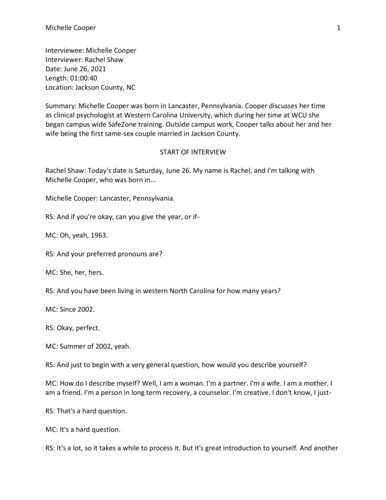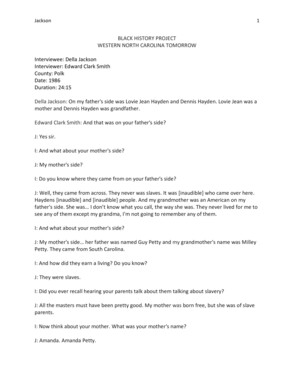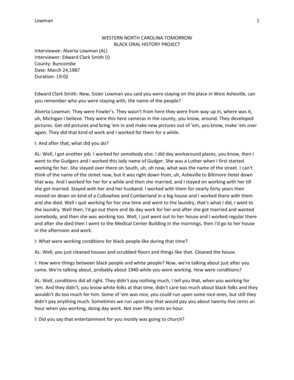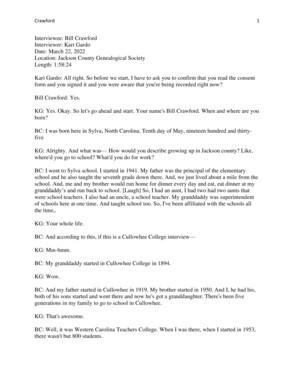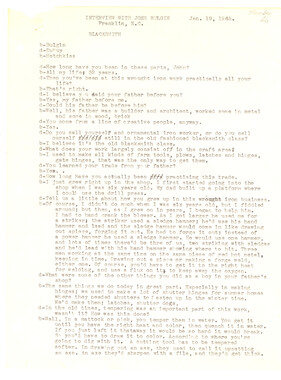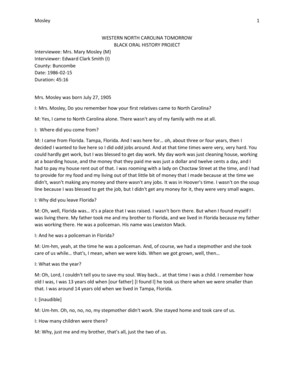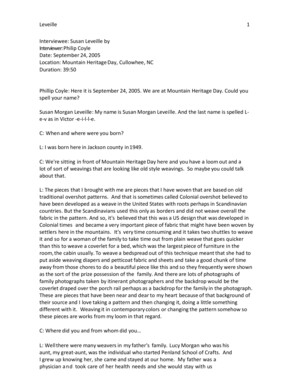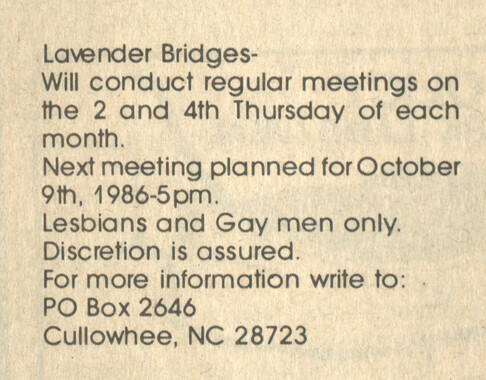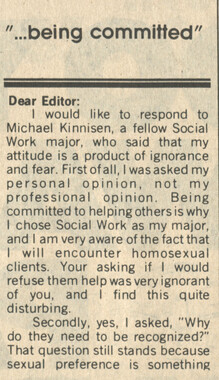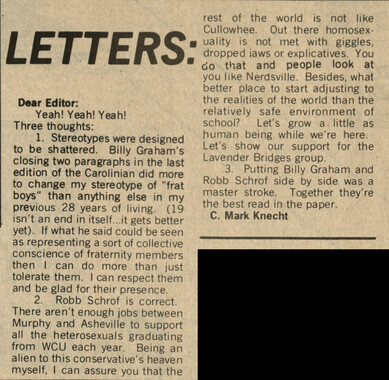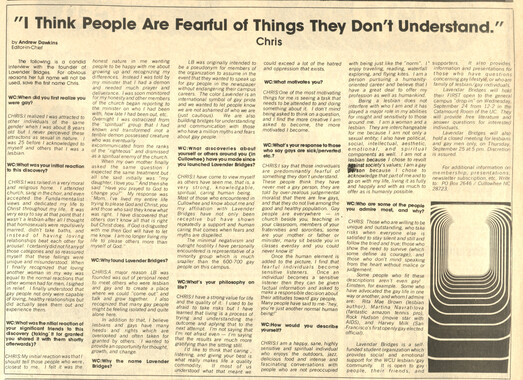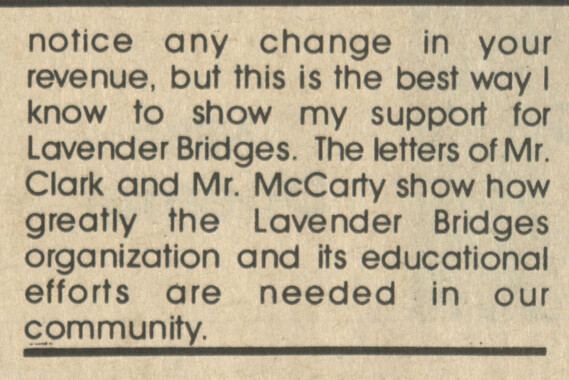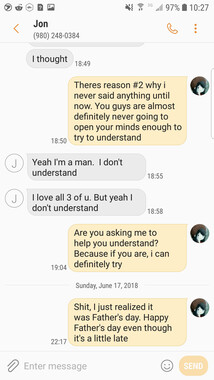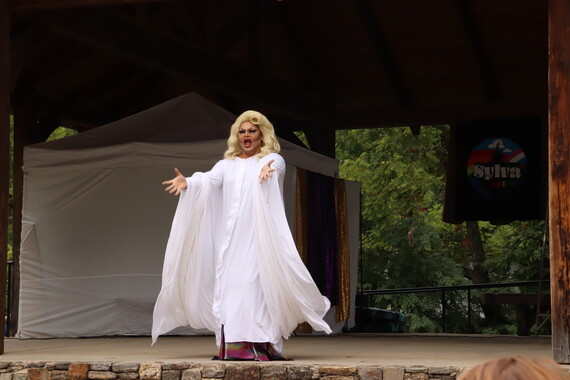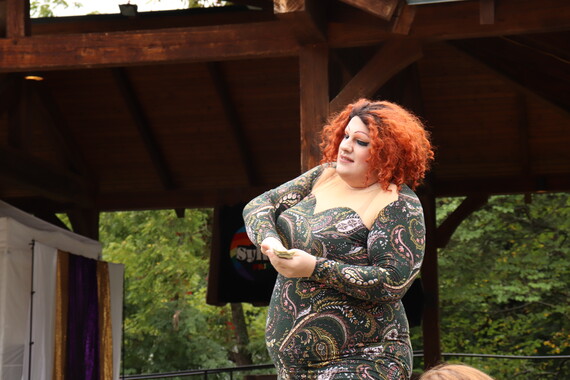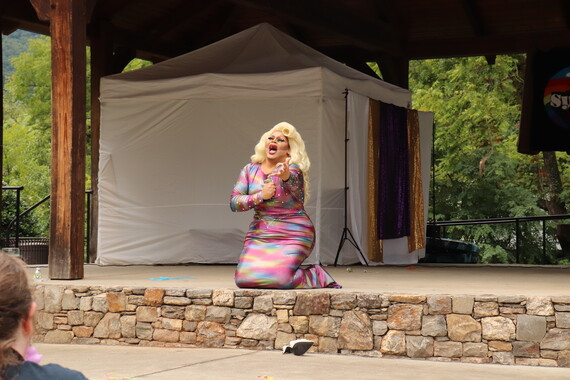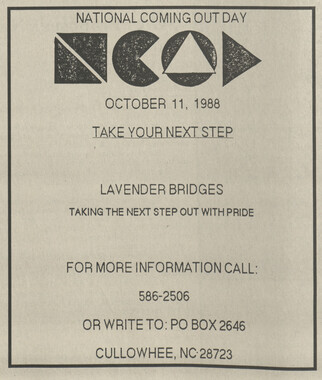Western Carolina University (20)
View all
- Canton Champion Fibre Company (2308)
- Cherokee Traditions (292)
- Civil War in Southern Appalachia (165)
- Craft Revival (1942)
- Great Smoky Mountains - A Park for America (2766)
- Highlights from Western Carolina University (430)
- Horace Kephart (941)
- Journeys Through Jackson (154)
- LGBTQIA+ Archive of Jackson County (85)
- Oral Histories of Western North Carolina (314)
- Picturing Appalachia (6772)
- Stories of Mountain Folk (413)
- Travel Western North Carolina (160)
- Western Carolina University Fine Art Museum Vitreograph Collection (129)
- Western Carolina University Herbarium (92)
- Western Carolina University: Making Memories (708)
- Western Carolina University Publications (2283)
- Western Carolina University Restricted Electronic Theses and Dissertations (146)
- Western North Carolina Regional Maps (71)
- World War II in Southern Appalachia (131)
University of North Carolina Asheville (6)
View all
- 1950s (1)
- 1960s (1)
- 1970s (4)
- 1980s (50)
- 1990s (10)
- 2000s (12)
- 2010s (19)
- 2020s (30)
- 1600s (0)
- 1700s (0)
- 1800s (0)
- 1810s (0)
- 1820s (0)
- 1830s (0)
- 1840s (0)
- 1850s (0)
- 1860s (0)
- 1870s (0)
- 1880s (0)
- 1890s (0)
- 1900s (0)
- 1910s (0)
- 1920s (0)
- 1930s (0)
- 1940s (0)
- Buncombe County (N.C.) (1)
- Jackson County (N.C.) (84)
- Appalachian Region, Southern (0)
- Asheville (N.C.) (0)
- Avery County (N.C.) (0)
- Blount County (Tenn.) (0)
- Cherokee County (N.C.) (0)
- Clay County (N.C.) (0)
- Graham County (N.C.) (0)
- Great Smoky Mountains National Park (N.C. and Tenn.) (0)
- Haywood County (N.C.) (0)
- Henderson County (N.C.) (0)
- Knox County (Tenn.) (0)
- Knoxville (Tenn.) (0)
- Lake Santeetlah (N.C.) (0)
- Macon County (N.C.) (0)
- Madison County (N.C.) (0)
- McDowell County (N.C.) (0)
- Mitchell County (N.C.) (0)
- Polk County (N.C.) (0)
- Qualla Boundary (0)
- Rutherford County (N.C.) (0)
- Swain County (N.C.) (0)
- Transylvania County (N.C.) (0)
- Watauga County (N.C.) (0)
- Waynesville (N.C.) (0)
- Yancey County (N.C.) (0)
- Clippings (information Artifacts) (46)
- Interviews (25)
- Photographs (23)
- Sound Recordings (21)
- Transcripts (24)
- Video Recordings (physical Artifacts) (4)
- Aerial Photographs (0)
- Aerial Views (0)
- Albums (books) (0)
- Articles (0)
- Artifacts (object Genre) (0)
- Bibliographies (0)
- Biography (general Genre) (0)
- Cards (information Artifacts) (0)
- Crafts (art Genres) (0)
- Depictions (visual Works) (0)
- Design Drawings (0)
- Drawings (visual Works) (0)
- Envelopes (0)
- Facsimiles (reproductions) (0)
- Fiction (general Genre) (0)
- Financial Records (0)
- Fliers (printed Matter) (0)
- Glass Plate Negatives (0)
- Guidebooks (0)
- Internegatives (0)
- Land Surveys (0)
- Letters (correspondence) (0)
- Manuscripts (documents) (0)
- Maps (documents) (0)
- Memorandums (0)
- Minutes (administrative Records) (0)
- Negatives (photographs) (0)
- Newsletters (0)
- Newspapers (0)
- Occupation Currency (0)
- Paintings (visual Works) (0)
- Pen And Ink Drawings (0)
- Periodicals (0)
- Personal Narratives (0)
- Plans (maps) (0)
- Poetry (0)
- Portraits (0)
- Postcards (0)
- Programs (documents) (0)
- Publications (documents) (0)
- Questionnaires (0)
- Scrapbooks (0)
- Sheet Music (0)
- Slides (photographs) (0)
- Songs (musical Compositions) (0)
- Specimens (0)
- Speeches (documents) (0)
- Text Messages (0)
- Tintypes (photographs) (0)
- Vitreographs (0)
- WCU Gender and Sexuality Oral History Project (23)
- A.L. Ensley Collection (0)
- Appalachian Industrial School Records (0)
- Appalachian National Park Association Records (0)
- Axley-Meroney Collection (0)
- Bayard Wootten Photograph Collection (0)
- Bethel Rural Community Organization Collection (0)
- Blumer Collection (0)
- C.W. Slagle Collection (0)
- Canton Area Historical Museum (0)
- Carlos C. Campbell Collection (0)
- Cataloochee History Project (0)
- Cherokee Studies Collection (0)
- Daisy Dame Photograph Album (0)
- Daniel Boone VI Collection (0)
- Doris Ulmann Photograph Collection (0)
- Elizabeth H. Lasley Collection (0)
- Elizabeth Woolworth Szold Fleharty Collection (0)
- Frank Fry Collection (0)
- George Masa Collection (0)
- Gideon Laney Collection (0)
- Hazel Scarborough Collection (0)
- Hiram C. Wilburn Papers (0)
- Historic Photographs Collection (0)
- Horace Kephart Collection (0)
- Humbard Collection (0)
- Hunter and Weaver Families Collection (0)
- I. D. Blumenthal Collection (0)
- Isadora Williams Collection (0)
- Jesse Bryson Stalcup Collection (0)
- Jim Thompson Collection (0)
- John B. Battle Collection (0)
- John C. Campbell Folk School Records (0)
- John Parris Collection (0)
- Judaculla Rock project (0)
- Kelly Bennett Collection (0)
- Love Family Papers (0)
- Major Wiley Parris Civil War Letters (0)
- Map Collection (0)
- McFee-Misemer Civil War Letters (0)
- Mountain Heritage Center Collection (0)
- Norburn - Robertson - Thomson Families Collection (0)
- Pauline Hood Collection (0)
- Pre-Guild Collection (0)
- Qualla Arts and Crafts Mutual Collection (0)
- R.A. Romanes Collection (0)
- Rosser H. Taylor Collection (0)
- Samuel Robert Owens Collection (0)
- Sara Madison Collection (0)
- Sherrill Studio Photo Collection (0)
- Smoky Mountains Hiking Club Collection (0)
- Stories of Mountain Folk - Radio Programs (0)
- The Reporter, Western Carolina University (0)
- Venoy and Elizabeth Reed Collection (0)
- WCU Mountain Heritage Center Oral Histories (0)
- WCU Oral History Collection - Mountain People, Mountain Lives (0)
- WCU Students Newspapers Collection (0)
- Western North Carolina Tomorrow Black Oral History Project (0)
- William Williams Stringfield Collection (0)
- Zebulon Weaver Collection (0)
- College student newspapers and periodicals (44)
- Gender nonconformity (4)
- African Americans (0)
- Appalachian Trail (0)
- Artisans (0)
- Cherokee art (0)
- Cherokee artists -- North Carolina (0)
- Cherokee language (0)
- Cherokee pottery (0)
- Cherokee women (0)
- Church buildings (0)
- Civilian Conservation Corps (U.S.) (0)
- Dams (0)
- Dance (0)
- Education (0)
- Floods (0)
- Folk music (0)
- Forced removal, 1813-1903 (0)
- Forest conservation (0)
- Forests and forestry (0)
- Great Smoky Mountains National Park (N.C. and Tenn.) (0)
- Hunting (0)
- Landscape photography (0)
- Logging (0)
- Maps (0)
- Mines and mineral resources (0)
- North Carolina -- Maps (0)
- Paper industry (0)
- Postcards (0)
- Pottery (0)
- Railroad trains (0)
- Rural electrification -- North Carolina, Western (0)
- School integration -- Southern States (0)
- Segregation -- North Carolina, Western (0)
- Slavery (0)
- Sports (0)
- Storytelling (0)
- Waterfalls -- Great Smoky Mountains (N.C. and Tenn.) (0)
- Weaving -- Appalachian Region, Southern (0)
- Wood-carving -- Appalachian Region, Southern (0)
- World War, 1939-1945 (0)
Interview with Michelle Cooper, transcript
Item
Item’s are ‘child’ level descriptions to ‘parent’ objects, (e.g. one page of a whole book).
-
-
Michelle Cooper 1 Interviewee: Michelle Cooper Interviewer: Rachel Shaw Date: June 26, 2021 Length: 01:00:40 Location: Jackson County, NC Summary: Michelle Cooper was born in Lancaster, Pennsylvania. Cooper discusses her time as clinical psychologist at Western Carolina University, which during her time at WCU she began campus wide SafeZone training. Outside campus work, Cooper talks about her and her wife being the first same-sex couple married in Jackson County. START OF INTERVIEW Rachel Shaw: Today's date is Saturday, June 26. My name is Rachel, and I'm talking with Michelle Cooper, who was born in... Michelle Cooper: Lancaster, Pennsylvania. RS: And if you're okay, can you give the year, or ifMC: Oh, yeah, 1963. RS: And your preferred pronouns are? MC: She, her, hers. RS: And you have been living in western North Carolina for how many years? MC: Since 2002. RS: Okay, perfect. MC: Summer of 2002, yeah. RS: And just to begin with a very general question, how would you describe yourself? MC: How do I describe myself? Well, I am a woman. I'm a partner. I'm a wife. I am a mother. I am a friend. I'm a person in long term recovery, a counselor. I'm creative. I don't know, I justRS: That's a hard question. MC: It's a hard question. RS: It's a lot, so it takes a while to process it. But it's great introduction to yourself. And another Michelle Cooper 2 more general question that can be a little tricky, but where do you usually like to start your story? MC: Well, when I responded to the interview, I was super excited because I thought this project was a tool to begin to create a space to look at that LGBTQ history here at Western, and how the Safe Zone came into being, and the many people that came before that. And so, my story around that particular question, I just would want to begin it my part in it and where I was. So, I guess that's where I would want to begin the story, in terms of my involvement, and the small part I like to say I contributed to when I was here as part of the Western community, but even as a resident of Jackson County, because this is home. This is home for me and for my family. RS: So, how did you get involved with Safe Zone training originally? MC: Well, I have always... My professional career, most of it, was in collegiate mental health. So, I was a counseling center psychologist in every university that I've been a part of. Even back in my graduate school training, I'd always been involved in social justice and, gosh, even as an undergrad, creating safety for those of us that have been marginalized or unheard. And so, whether it was as an undergrad, or as a master's student at Penn State, or going out for my doctorate in Massachusetts, and then working professionally at the school that I was at prior to coming to Western, I was always involved in doing what I call bridge work with diversity related issues. And I was part of the women's community in the LGBTQ community at my previous institution, and we're doing things with multicultural affairs there. And so, when I came to Western, it was just a natural fit to participate in that. So, it's really been part of who I am for as long as I can remember. And now I've forgotten that question, so I'm going to stop and let you restate it, see if I answered it. RS: Oh, I was just asking how you got involved with Safe Zone training, and just, were there Safe Zone trainings already established at the previous universities you went to or did you justMC: Oh, yeah. Oh, yeah, yeah, yeah, yeah. Western was so far behind. Coming from up north, we had women's centers for decades. We had multicultural affairs. They were well established services. As a counselor in the counseling center at Shippensburg, I was a member of a professional association called the Council for the Advancement of Standards or CAS. And what that network, it's like accreditation, but it's a self-study model, so it's like AAA, where you come in, and are you AAA certified? It's peer reviewed. So, you would participate if you wanted to look and see if your counseling center services, or your multicultural affair services, or your LGBT services, or whatever the co-curricular activities were in a university, if they were up to quality standards, they met the CAS standards. So, they decided what the baseline services and then what was above and beyond. So, I was on that board as a representative from the American College Counseling Association and the Counseling Association as a professional service. So, that's what I did as a counseling center psychologist at my previous institution. And I can't remember if when I was serving on that board there, when I was at Ship, or if it was when I came to Western. I think it was when I was before here, but it must have been. It was Michelle Cooper 3 2000. That's when the LGBT services standards came into existence. So, I was actually up in DC. They had a Millennial March up there. And that was when I was actually there for the board meeting, at the time of the Millennial March, when the LGBT services standards came into existence, which is basically what were quality LGBT services in a higher education center setting. And they became part of the CAS booklet, the standard template or whatever. So, that's always been a part of my identity and who I am as a person as a professional. And so, I knew that that was here, and when I got to come to Western and work, back then it was counseling and professional. It was just CPS instead of CAPS, and it actually met in the first floor of Scott. Scott doesn't exist anymore. But there actually had been a group before I was there. And there was a counselor before me at the counseling center, whose name was also Michelle, but it was Michelle Mazzucco, or something else. But John Ritchie, who's the former director, and he lives here in Sylva, he could tell you her name, probably. And so, it was me, and John, and June Wytock, and she's no longer alive, and then Laurie Jackson. And she works in the counseling center, I think, at NC State now. I've kept in touch with her, and then myself. So, it was just four of us, and then interns. But I got to join in this work group that was bringing to see if we needed to have a safe space program at Western. And so, that's how I got involved. I wanted to be involved in that group. And June and others in the counseling center were a part of it. But I got to volunteer and become part of the workgroup that actually listened when they had... I guess there was Rebecca Caldwell. She was the head of the women's center then that had just formed. I was like, "Just formed," and they've been around for decades up north. And Dwaun Warmack was the first director of the multicultural affairs department. And they were two separate entities at that time in the UC. And there were a bunch of us that were on this... I don't know what it was called, a Safe Zone council or whatever. But they brought this trainer down from IUP, Indiana University of Pennsylvania. And she trained us and did a two day training. And at that training, the students, Be Glad, had put together a PowerPoint presentation to basically demonstrate that there's a need. Well, everybody knew that there was a need to have a Safe Zone program. But we just learned how to have a model here. And so, they shared how they got one set up at IUP. And we took from that and used their training model and adapted it. And then I oversaw a group of faculty and staff that wanted to be on the training committee. So, I was the overseer of the training committee and helped give birth, co-created. Val Nybo was a professor in... What was she in? She was in health and human services or something. I don't remember. Jill would probably remember what Val taught. But she did the backstory of the PowerPoint presentation, created the graphics, and I worked on coming up with the content. And then there was another professor. I can't even remember her name. But it's all in those archives that Jay has of CAPS because the original trainings were in there. And there might have even... Anyway, so it was a train the trainer model, and then we created the training, and then someone designed the sticker. I think Val created the first sticker. And the way that it was initially was all of us that created the training trained ourselves, and then we ran the whole thing. It was like, we did the trainings, we created the stickers, we kept track of everything. And we just did it because it was a labor of love, and we wanted students Michelle Cooper 4 to feel safe here. We wanted people to feel like we had a right to a safe living and learning environment here. And so, it was just a group of us that did it a service initially for a couple of years. So, that's how I got involved initially, and then it went on from there. So, I don't know where you want me to go. RS: That's great. Who did the Safe Zone training? Who originally wanted to do the Safe Zone training outside of your group? MC: There was... Is Jane Adams-Dunford still here? RS: I do not know. MC: Jane Adams-Dunford was in... This was before... Is Sam Miller still the vice chancellor of student affairs? RS: Maybe. MC: Okay, so before Sam Miller was here, there was a vice chancellor of student affairs named Bob Caruso. And Bob Caruso was the vice chancellor that hired me and hired... Well, I was hired when he was vice chancellor. And he was very much an advocate for LGBT services and the Safe Zone training. And I think it started, and Jane Adams-Dunford worked under this Office of Student Affairs, and she oversaw a planning group that I'm trying to remember. I think most of the people that were on that planning group are no longer here, other than... Golly, I'm seeing his name and I'm blanking. Not Brian Woods. Chris Dahlquist, he might still be at UNCA. Because I think he left Western. He was in human resources. And then he went to, I think, work in human resources at UNC Asheville. So, look and see if Chris Dahlquist is there and interview him, because I'm pretty sure he was on the original planning group that justified the reason for the Safe Zone committee. I went to the first training, and oversaw the training committee that created the Safe Zone program at Western. RS: Okay. MC: Does that make sense? RS: Yeah. MC: And then what was really cool was because we had this hook in with HR, Chris, we would advertise them through human resources. So, we had this really wonderful bridge connected with some credibility through the human resources connection. And then after Chris left the university, I think Kathy Wong was our director of HR right then. And so, it was just this network of faculty, staff, and students, but the faculty staff really helped hold it together. Because it's really up to the university to create a safe living and learning environment. And we had this vision that we would have an LGBT center here at Western, just like a lot of universities do up north. We wanted to have that here at Western to make sure that it was part of the permanent Michelle Cooper 5 infrastructure, that it wasn't just up to a student organization to create safety for themselves. No, this is the university's. So, at one point in time, and I got to serve on this workgroup, Jane helped me to become part of a workgroup with the legal… hat is her name? There was a woman whose name... I see her right in my face, I cannot remember her name. But she was the head legal counsel before the current Shawn or whatever it is that's the legal counsel for the university. And it'll come to me at some point. But there was a workgroup that looked at having LGBT language, getting worker protections. So, after Safe Zone got started, there were a group of faculty and staff, they said, "We want to have a group like the students do. Why can't we have a network? Will you help us create one?" So, I helped create this group called Family Circle. That's what we call ourselves. And loosely, it was just this really rough... And if you ask Jill about Family Circle, she helped us do the backstory stuff of... There was a discussion list or whatever. And she was like, "There's this community group, Out in the Mountains, which you've probably already heard about." So, I got connected with Out in the Mountains. But I didn't really... I knew Out in the Mountains existed, but I didn't start going to Out in the Mountains personally until I... Well, actually that's not true. I think I went to one or two events. At the time, I was married and had kids. And so, part of this was... I was out to my husband, and I've always been involved, but everybody thought of me as an ally. And at the time, allies weren't as welcome to Out in the Mountains as members of the community, or at least that's what it felt like at the time. And so, after my marriage ended, and I divorced my husband, and that relationship was ending, that was when I got more involved in Out in the Mountains. So, I knew all the people in Out in the Mountains, but they always thought of me as an ally, and I was not... I was out to whom I felt comfortable with. Our two young children, it's like, I wanted to be safe. And then God brought a woman into my life when I was going... So, now I'm married. I was actually the first, my wife and I were the first... If you Google for same sex couple in Jackson County, North Carolina, you'll see our wedding video. RS: I did some snooping and I saw it on the Sylva Herald. MC: You saw it on the Sylva... Yeah, yeah. So, you'll see us, and actually, I would love to donate that video to the archive, because it was such a precious day. Because Julia and I were just showing up. I had asked to get off work that day, or that morning, because it just went through, the amendment just went through in North Carolina the Friday at 5:30. So, there was no way anybody could get married when it finally got passed and went through. So, Monday morning was the first time that anybody could get legally married in North Carolina. And so, Julia and I both asked off for that morning because we were going to show up at the register of deeds at least to get the paperwork in place. We weren't sure we were going to actually do it, because we'd already been married at St. David's. But we were going to get the legal paperwork in place so that our marriage would be recognized. And so, we show up at the clerk of courts. And it's so funny because Mr. I think Joe Hamilton, who's the clerk of courts, he was there that day. And he just got... And the Sylva Herald just got Michelle Cooper 6 recognized for his service. And I just wanted to echo that, but I don't know that he would appreciate being… You know, yes, and you must feel… we got the first marriage license in North Carolina. But we showed up at the clerk of courts first thing in the morning, and Dottie and Jane were there, and no, yeah. And we walk in there, and they're like... They came to our commitment ceremony. And they were there, "Julia, you get to be first, you get to be first." And we're like, "What are you talking about?" Because we were just connecting, and they had been married, but their marriage was not... They were afraid their marriage wasn't going to be recognized as valid because it was in another state. And so, the person from the clerk of court said, "No, now you can't get married in North Carolina, because that would be polygamy, and that's against the law, because you're already married." And so, their marriage was already signed, sealed, delivered. So, they had pre-arranged to have someone from the Sylva Herald, and the pastor, Rosemary Peek, who's a wonderful ally and advocate. And she... They were all showing up at the clerk of courts. So, we're like, "Would you want to get married?" And we're like, "Okay." And then the coolest thing was, is that Rosemary was a Lutheran pastor. And I was born and raised Lutheran. So, to have the Lutheran vows was just precious to me, because that was my faith growing up as a child. And so then, that was the first time we met her. So, that video, and after we got married with the service, that was the first time we met Rosemary. And then after, we were just talking randomly, and then they were just sharing about just hearing their story about being at Stonewall, and not ever even... It just was like, what a precious piece of history that just to me shows what a kind of place Jackson County is. Because I think this is the best kept secret on the planet. They're such a loving... People are people here, and people love from the heart. And yeah, they may have some... There's been some hurtful things that have happened. But underneath that all, people love people here. And I really... That's why this is home for me. So anyway, I got off on a tangent, but I'm so glad you looked at that. That's so cool. RS: No, I'm so happy you shared that. That sounds like such a sitcom moment. Just like the wedding happening all the sudden. MC: Yeah, it just happened all... Well, we had our service. And the cool thing was, is we had our commitment ceremony at St. David's. And we had to call it a blessing, because they weren't allowed to call it a marriage because of where things were back then. And that was on 6/7/8, June 7th, 2008. And so, we almost... We weren't able to get married like we said, 6/7/8. Okay, well then let's get legally married on 9/10/11. But it didn't quite work out that way. And it wasn't 10/11/12. But it was, I think, 10/13/14. So, it was sort of there, but not really. But anyway. But yeah, so now we're legally hitched, and we were the... And actually, I think there's another piece of history in the... I don't know if it's still there, but the Equality Campaign in North Carolina for marriage equality, there was a campaign for marriage equality. And people would get married for equality. And so, when Julia and I were married in 2008, we were the first couple in the Equality Foundation of North Carolina to pledge to have donations that in lieu of gifts, we asked for people to donate for marriage equality, so that our marriage could be recognized. And we were the first couple. So, we were Michelle Cooper 7 like, "Yes, sir. We are the first couple western North Carolina." Not the whole. It wasn't Raleigh, it was western North Carolina, and we wanted the whole state to donate money so that we could have marriage equality, just like... And we lived to see the day that actually happened way sooner than we thought it would, which was super cool, especially after that amendment passed. That was just such a disheartening moment. But no, I always felt like when I lived in Shippensburg, Pennsylvania, and I was married, I lived a privileged life, as I identify as bi, and was in a committed relationship. So, my kiddos, we've always been people are people. And so, there was a LGBT community in rural Shippensburg that was... Everybody thinks that gay people are only in cities. And it's just like, that seemed to be the belief that that's where all... But it's like, those of us that identify as something other than heterosexual, we like rural living too. You know what I mean? It's just a lot more... Have you interviewed Christopher Wilcox? RS: Not yet. MC: Okay. He's the hub of all the LGBT businesses in the whole region. And he's been a hub, and he and his partner have been overseeing Out in the Mountains, which really is... I don't even know if it gets together much other than the holiday party at his parents' house, but there are other networks of LGBT communities here among older folks that are trying to meet. But I think there's also more of a comfort, where people are just able to make connections outside of everyday relationships. It's seeming more accepting than it was. Although it's unfortunate in the faith communities. I think that that's the part where it's been... Julie and I tried to join a church, that we so wanted to be part of a faith community that was... I identify as Christian, and interdenominational prayer and praise, contemporary worship, faith community. And we got involved in a faith community, and we're in a focus group, and do Bible studies, and filled out the paperwork and everything to join the church, and then we couldn't join the church because we weren't the right Christians. And I was like, we were so blindsided by that. It was such a... I just didn't think that that type of prejudice was still present. And I respect that, because your faith is what you choose to believe, but that is just not my definition of Christianity, or ever was. But I completely know that pain and suffering. And I think I've lived a pretty privileged life in so many ways. But that just, yeah. So, that was just... See, I don't know where I got off on that tangent, but... So, you get me talking, and then I'll just go talk about all kinds of stuff, I don't even knowRS: No, you're doing great. You're the best kind of person to interview. You're telling so many great things. Do you remember what year the church incident happened, ifMC: Yeah, let me think, okay. I was in... It had to have been... Because I think we were still living in Dillsboro. So, it would have been, I would say, probably about six or seven years ago. RS: Wow. Michelle Cooper 8 MC: Yeah, yeah. And then, it was definitely before 2014 when we got... So, it had to have been before 2014, because that's when... After we met Rosemary, we were like, "Okay, let's go to that church." And that's a sweet, sweet church, and I love the little Lutheran Church, but it's not the contemporary worship. I love the jamming and the dancing and all that in my praise and worship. But it's unfortunate, because there aren't contemporary Christian faith communities that are gay affirming here in western North. There still aren't. I have looked at other contemporary Christian, but they just really have much more of a rigid viewpoint around. There's a Unitarian Church, but it's down in Franklin, and I don't want to drive to Franklin. So, anyway, I'm sorry, I'm going off on a tangent. RS: Oh, no. MC: I want to be able to pick my... It's a design of God's, so it's okay, my faith and spirituality are alive and well, and it's wonderful. But it is... That was always the first thing that I did when I worked at a university, is I would go and I would befriend the united campus minister head, and I'd learn the low down on the faith communities and which ones were... Seriously, because there's a lot of wounding that happens, and I wanted to know as a counselor how to support young people that didn't then get further harmed when they were already in a struggling place. Because suicide is the leading cause of death for our LGBTQ community. So, there was a part of that that I was very much wanting to be intentional about, knowing what the faith communities were really like wherever I... So, that's a great... And I would always tell people, "Go to the campus minister at the church, at the school, at the university." Because they're going to have to be representative of all of the faith practices. Unless you go to a religious school, in which case, you're at a religious school, so you're going to go with whatever that is. But anyway, I'm going off on a tangent, so I will be quiet. RS: And just going back to Safe Zone training in Western, do you remember specific LGBT organizations that were on campus at the time outside of Safe Zone training? MC: At the time, well, before, when Michelle was here at the counseling center, there were some group called Lavender something. RS: Lavender Bridges. MC: Lavender Bridges. And that was the group that was the first one. But I would really love for you, and I'll have my wife follow up with you too, because she was a student here in the '80s. So, she might have had... Because I think there were groups, but I don't know that they were out or public, or were organized in any way, shape, or form. Be Glad was the one that was here when I was here. And then they went through a change and morphed into a group called Unity. And that was the organization that I was... Well, I may see if I can still find that on one of these flash drives, because it is... Maybe I saved it on my computer. But in any event, I'll see if I can find it again. But that was when we had Mandy Carter come, and they were super active on campus, and did Michelle Cooper 9 a lot of bridge work. And what I was trying... Because it's like the students create the community. But when I had been at Shippensburg, what were they called? They were called SAIL. I don't even... I think it was... I don't remember what it was. SAIL, like in Shippensburg and ship and sail, but they had a advocating LGBTQ equality, maybe, I don't know. But they would have an allies’ conference. That was one of their things. And it was the coolest thing because they got together the LGBT group, and then they were all hubbed in the multicultural affairs, or diversity, whatever the name of it was back then. And Diane Jefferson was the overseer. And she was an amazing woman, an amazing ally. And what she did is she created such a safety among all of the... It was a safe space. All of the organizations, they would have this allies’ conference, and the LGBT group was the driver of it. But all of the student organizations participated in the conference. So, basically, you would have this cross section. And they invited student organizations across the Pennsylvania State System to submit papers. So, all of the students at these different campuses in the Pennsylvania higher ed system, like North Carolina, would submit papers, and it was peer reviewed, it was all run through there. But they would talk about their different advocacy and what they did. And they had a professional conference for allies for all of these different diversity issues. And they would hold that once a year. So, that was thinking of if that could ever evolve here to become something that would be that the students would want to create here, because if the students have power and voice, that's where the change happens on a campus. So, Unity was moving in that direction, and they brought Mandy Carter to come speak, and I got to... That was when a couple of times we brought the AIDS Quilt to campus, and it got to be at the counseling center. We did the training for the AIDS Quilt when that came and when... What is the name? Cleve Jones, the guy that wrote about, that developed the AIDS Quilt, he's out in... He came and spoke. And so, when Unity was here, there were a lot of really prominent things happening. And it seemed like energy was really moving in a positive direction like there might... Because at that time, the Safe Zone coordinator was really just a part time graduate student position, that they didn't have the continuity or the stability to really move forward. So, there was an ebb and flow to the Safe Zone program. I have no idea, does it still happen? Is there still a Safe Zone program here at Western? RS: Yes. MC: Okay, cool. Because I had left the university. I left here to go work at UT Knoxville in 2016. But then that was just not a good fit. Then I couldn't deal with the commute. I was not about to move away from these mountains, so I've just been living in the mountains just doing community mental health work, but got out of working at the university setting. So, that was good, but yeah. Other student organizations after Unity, I don't know what they... There was... I'm not sure where they went if there were more than one organization. I think there was talk of that. But in the counseling center, once when we were running the Safe Zone program and making it happen, then there was this transition when the Safe Zone program became its own organization. Stephanie Hesbachar would be a good person to interview, and I could probably Michelle Cooper 10 find her on Facebook, because she was one of the first Safe Zone coordinators, and believe it or not, she had been an undergrad at Shippensburg, and went for her master's and got her master's here. Or maybe she got her master's... I think she got her master's here. But she was in that student organization that did the allies’ conference and everything up at Shippensburg, and then she was actually the professional running the Safe Zone committee and helping to do the trainings. And I think that's when things got a little bit more strengthened. But I stepped back, and I was just a counselor, and then Jay was hired. And so, he took over because I did the Family Circle for faculty staff, and I did a support group. But then I'm also one that as a counselor, and I was assistant director at the counseling center, So when we had new staff, psychologists or counselors, that had a passion for something, let's just step back, Michelle, and let them take the reins and move forward and let it take on a life of their own. So, there were other counselors, like Tomandra Sam was here for a short period of time. Jay Manalo was here. Carol Simpson, who was in the picture when Mandy Carter was here. So, there was a lot of other faculty staff that were more involved in the supporting of the LGBTQ community. As I continued in my professional career, I was assuming more clinical services kinds of stuff, and just stepping back. And support had always made sure I had my updated sticker and helped out wherever, but then Jay did a lot of the Safe Zone trainings with the Safe Zone coordinator in more recent years. So, he would be a great interview for that as well. RS: And would you like to go back to the AIDS Quilt, and Cleve Jones coming on campus, just talk about that more specifically? MC: Well, the AIDS Quilt has been here at least twice. And when you have the Quilt, at least when I was here, it was here two different times. And the first time it was here, I did... In order to be a quilt monitor, you had to go through comprehensive... It's a national treasure. And so, to have that for display, each panel had to have quilt monitors to protect it. And so, there were these wonderful educational opportunities that we had for students that wanted to get... And so, all the professors would give them extra credit if they volunteer to be quilt monitors. And I'm sure they thought, oh, yeah, I'm going to just show up and stand by a quilt. But no, you had to go through this really robust educational training. So, I helped create the training, and then the next time it came, we automated it. So, it made it a heck of a lot easier than doing them in person. But that's just the technology changes. But he was amazing to hear, to speak. And I'm mixing up because I also got to... I didn't meet him when he was here with the Quilt, but I met him when I was in San Francisco over the anniversary of Harvey Milk's death, and went to... There's a museum in San Francisco. And Cleve, he just happened to be in the neighborhood, and he stopped in because they were having a reception to honor his life. So, I got a chance to interact with him a little more in reference to his trip to Western, and he was... And people are always impressed when they find this thriving, diverse community in the middle of nowhere. And I love that about Western, and Sylva in general. It's just a wonderful melting pot community that has a long history of being Michelle Cooper 11 inclusive. So, that's been really precious. But that's really all that stands out for me at that time. I wish I could remember more, but I'm getting old, so I can't remember. I'm trying to think of... Oh, Daniel Karslake was here too. That was... Claire Eye, she might still be here. She's a professor. She was a professor in fine and performing arts. But when Daniel Karslake did the story of... He did the film, For the Bible Tells Me So, that won Sundance Film Festival. And he was... And so, they brought him here to talk about it. It must have been in the theater department. But he shared how he's from Boston, and he did some sort of... There was some sort of a story that compelled him to do this documentary, For the Bible Tells Me So, because he was doing some radio show, and somebody that was gay was suicidal on the call-in show. And the problem that was driving them to kill themselves with the church, was feeling like I'm damned to hell because of who I am. And so, he did this documentary called For the Bible Tells Me So. And it's basically showcasing stories of, I think they interviewed the first, Gene Robinson and his family, he was the first out gay bishop, and then Dick Gephardt’s daughter, I think, who is a former politician, and she's gay. Anyway, you'd have to watch. It's a great documentary, but it does a nice... And actually, the little clip in that film that talks about sexual orientation was put into the Safe Zone training, because it was just so good to just give a little synopsis of the history and the science underneath it, not looking at people's fixed beliefs like the social construction that fed a lot of the biblical narrative that's oppressive. So, they brought Daniel. Claire Eye, I think, was responsible for bringing him here for a speaker, and I think that was something. See, it's at a university. I don't know if it was part of Safe Zone, or if it was part of what. She also was involved in bringing the Laramie Project. You probably have talked about that. Have you heard about? RS: We have not. MC: Oh, my gosh, that was incredible. That was before, when Chancellor Bardo was still alive or still here as chancellor. Yeah. And he was... I don't remember when it was. But Claire Eye brought the Laramie Project to come for the students to produce, okay. And I was working in the counseling center, and I worked, and Bill… He's the vice chancellor of student affairs over at UNC Asheville. Bill Haggard. RS: Oh, yes. MC: Okay. So, talked to Dr. Haggard about… RS: I'm interviewing his daughter next Thursday, so… MC: Okay, well, talk to... Well, what is his daughter's connection? RS: Oh, she's gay. Michelle Cooper 12 MC: Oh, wait, did she come out? Oh, my gosh, okay. I didn't know that. Well, see, now that you know that, you should also interview, and I can get you Matt Turpin. He went to Smoky Mountain High School. And you could interview my daughter too. She's here, because she was.... She would be a good person to interview. But anyway, let me tell you this story. So, Laramie Project, backstory with that. Claire Eye's bringing that production here. I'm sitting in this, because Dr. Haggard was in charge of this critical incident communication team. It was these group of professionals that helped ensure that if there was a critical incident, we were prepared. And I represented the counseling center around the psychological health of the issues, and there was the chief of police, and there were all these... Well, come to find out that you've ever heard of Fred Phelps? RS: Yes. MC: Okay. Well, Fred Phelps, our former chancellor, Chancellor Bardo, when he was a lawyer was on the committee that got Fred Phelps disbarred. So, we made, little Western Carolina University made the Fred Phelps organization's hit list or whatever they did. So, they targeted us, and I learned about it in this critical incident, that their organization was going to come, and they were going to try to incite. Because what they do is they register at universities to protest in the protected place for protesting. And then they tried to incite the crowd with all their radical stuff to then sue the university because they were not protected, because they were in the safe protected place. It's very sneaky, but effective. And so, we knew that they were targeting our university because the organization was upset with our chancellor. And so, there was a concern that there was going to be a huge thing. And there wasn't, and if anything that it really backfired because the Laramie Project was probably much better attended than it ever could have been. When they did the show, it really created, I think, some cognitive dissonance for a lot of the faith-based student organizations because they couldn't imagine that... Because here's this group saying they're Christians, and then advocating for people to be killed because of who they are, like that Matthew Shepherd's death was the right thing to do. And so, it created this really big cognitive. So, a lot of the faith-based organizations were really grappling with that in a way that I think was unexpected, but welcomed. And yeah, but it was a non-issue. But that was an interesting part of Western's history that you would have... And then there was this fear that okay, Sylva's just Sylva, but there's this perception, or there was at the time, that Asheville is like... I don't know, just way out there. And so, these radicals, people from outside are going to come in, and they're going to cause this huge thing in our little town. Nothing like that happened. I mean, the students all showed up because they wanted to see the spectacle, but they ended up getting educated about these guys are crazy. They have children there that are listening to that hate. That's not okay. And so it really, I think, served to be a wonderful... I think it was growth fostering for the whole LGBT. The allies, I think, became really empowered through that initiative because they had more voice to look at, well, no, I'm going to stand up for this because that's just the human right thing to do. So, that was pretty Michelle Cooper 13 cool. MC: But I should say, when Harold Herzog... I don't know who teaches the human sexuality class. It was Harold Herzog, and he's retired. And then I think Alvin Malesky taught it for a while, but I don't know who teaches it. But when Harold was teaching, he would always have students talk about... Beyond the panel to talk about sexual orientation issues and stuff. And so, it was the panel presentation. And then as time progressed, there were a couple times, I think twice, where he... Well, a couple of times, I would serve on the panel. But then there were at least two times where my daughter was on the panel, and she was a high school student at Smoky Mountain High School at the time. And she came because... Well, she'll tell her story side of the story now if you choose to interview her, but my side of the story was that she was super excited to get out of school, but nervous about talking to the college students. I just remember, this is a proud mama moment where it was over in the Fine and Performing Arts building, where they have those rooms that have... It's like an auditorium style room, but they have large classes because this class was super big. And so, we were sitting in the front and had the panel, and I just remember her and she was in high school and she's like, "You have to think. Now, think about this. When you say that's so gay, you're putting down my mom. You're putting down... Now, that is just not cool. You just don't use that language, just think about it. Use something else." She was just dicing these college students. But it's like, they're like, "Wait a minute, you're normal." It was somehow it seemed like it was going to be not okay to have same sex parents. But just to know that and that was interesting just because when I was in relationship with a woman and my kids were in elementary school, I made sure that I came out to all of my kids' teachers. They didn't know I did this, but I came out to my kids' teachers, and my kids' friends parents, so that they could steer... Just initially when I was in a relationship, because then I figured that way it's an adult-adult, and if whatever their values are they can parent the way they want to. But the last thing I wanted to have happen to my kids was that they would get ostracized or teased or bullied or something because of me because I happened to be in a relationship or married to a woman. It was just remarkable. Even, Fairview was a very... The teachers there were fabulous. I intentionally did not go to the principal, but I went to the assistant principal because I knew the principal was not going to be very receptive just because I knew who they were. But just the school was just phenomenal and supportive, and I got to be invited to go on the school field trip. So I must have been a halfway cool mom or not, and it was just a real... It was not what I feared it would be. I feared that my kids would get bullied. Their worst, at daycare, there was one situation, but then we were able to nip that in the bud, and wasn't in then she aged out of that. So, that wasn't an issue anymore. But yeah, it was a little concerning to have to worry if your kids were going to be bullied. I did have a chance to be a safe space for some of the teens. I didn't know the twins, the Haggard twins. They were older than my kids. So, I didn't know that... I mean, I didn't have any Michelle Cooper 14 connection with them. But in my kids' grades I did, was a support for some of the kids that were coming out or some of the parents that were grappling with how to be affirming, and supportive. So, it was just, there's just a really wonderful community here. So, that's been... But anyway, I don't remember what we were talking about. It just divulged into different disclosures. RS: I'll ask you one more question. Just again, going back to safe zone training because I want to make sure I cover all my bases with that. What were some of the specific topics that were covered throughout safe zone training for…? MC: Okay, so there were... And this is where Jay will have the actual... Because when I left the university I had saved copies because I was hoping someday somewhere they would do what you're doing, so I saved copies of different versions of safe zone training because it went through different iterations over the years. And there was always a component on knowledge, skills, and abilities. So, it's like... Or wait, knowledge, values. I can't... There was always things about knowledge and the history and then what an ally is, so there was a huge thing that was... It was really basic. It was like how to be an ally one-on-one, just definition of terms and that always had to be updated because they're just... And then we came up with all kinds of trying to do card sorts and matching games because we just kept finding more terms, and symbols, and history. Just snapshots of, of LGBT history, and people that are famous that are... A lot of trying to deconstruct the stigma, and then there was always something on the facts of where does this come from? What is this about? And then just when I was leaving, they were starting to look at trans. And they really need... I think, originally the vision was for this model, but I don't think it ever took hold. I don't know is that safe zone would not just be one class and you've got the sticker. We wanted to not just give away the sticker because when I was at Shippensburg, they just gave out the sticker. If you said you were an ally, you could get the sticker. Well, then what started happening was professors left, never took the sticker off their door. Somebody else that was a bigot went into that office, didn't know what the sticker was, and it was just there. And so, it ended up backfiring and so we... I don't know if that was at Shippensburg, or was at IUP or what, but at Western, we were like, No, we want the sticker to mean something that they actually went through some training. And so, there was a real concerted effort for that. And then the vision was that there would not be just the basic training, but eventually, they would have a recertification. So in order to keep your sticker or somehow you would get a punch that it was... So that we wanted to somehow have a mechanism to protect so that you would get recertified or... But I don't even know if that ever materialized. But the vision was to keep people really invested in staying committed to being educated. MC: I think it's interesting right now I'm looking at, I mean, what's happening in Sylva now with the Black Lives Matter and the whole statue and having the Pride Picnic, which was so cool, and I think this Saturday, I think tonight is a Drag show with Lazy Hiker, and the family friendly drag show that's going to be on the Pride Fest in September. But just today I just had somebody Michelle Cooper 15 share with me because this is our region, it's in Franklin. I got this. I didn't read the article. Let me see if I can find it here. A friend of mine said, "Michelle, this is from someone in Franklin. I was aghast at this letter having no idea this was happening in our community. I will make the call and have sent to others to chime in, but wanted to share with your community as well to assist in squashing this close minded thinking. If I didn't know better, I would think this letter was dusted off from years ago. It is so unsettling to me that this thinking still has such a voice. Thanks, Diane." And so, then she forwarded me, please call the library something, "Dear fellow Democrats, I fumed and fumed after reading the letter to the editor in the Franklin press entitled Objection to Pride Display in Children's Library, see below. You only have to read the title to know where this letter is going. I called the library and shared my concern that the display should not be removed, and that I totally supported their display. They were very appreciative of my call. Let them hear it from all of us. Here is their library number, 828-524-3600, Franklin Press, 06/23/21." So, this was in the Franklin Press on 06/23/21, and it's a letter to the editor. ”Are you aware of the perverse promotion at the Fontana Regional Library in Franklin and perhaps displays of this same perverseness at other regional libraries? I am speaking of the open celebration of homosexual behavior in the children's section of the Franklin branch library," blah, blah, blah, blah, blah, blah, blah. And then the last thing is a quote from Isaiah, "Woe to them who call evil good and good evil." And this is what contributes to people killing themselves, because they believe they're evil, and that just makes me so sad. Because this is probably a very good man. He is probably very kind, and loving, and giving, and he's... But they're brainwashed by this rhetoric, this legalistic rhetoric, and I am not a fundamental person, and I get it. But it just breaks my heart. So, anyway, but it's still here, and that's part of why it's so great that you're doing what you're doing because it's like this is part of why we're here. This is why I'm here, because this is my home. Anyway, I got off. RS: Do you have anything else you'd like to add? MC: No, but in terms of the training, when you do have the training... I do want to try to... You can turn off the video thing, so you can stop recording, but I do want to try to see if I can find this, because if I...
Object
Object’s are ‘parent’ level descriptions to ‘children’ items, (e.g. a book with pages).
-
Michelle Cooper was born in Lancaster, Pennsylvania. Copper discusses her time as clinical psychologist at Western Carolina University, which during her time at WCU she began campus wide SafeZone training. Outside campus work, Cooper talks about her and her wife being the first same-sex couple married in Jackson County.
-
